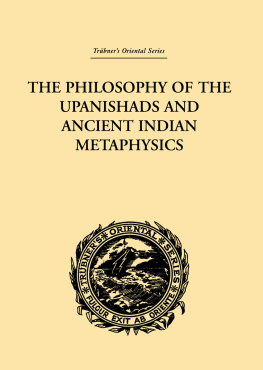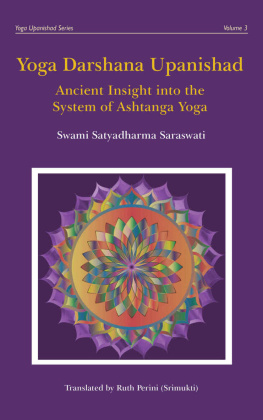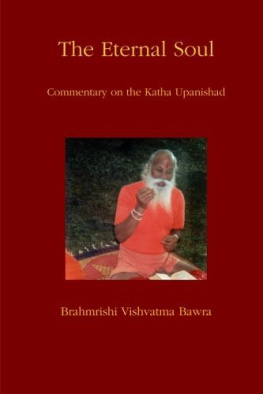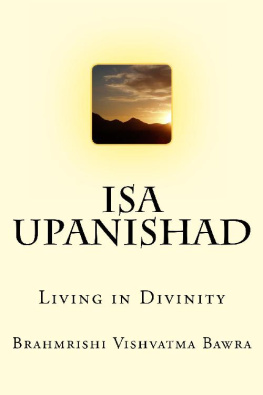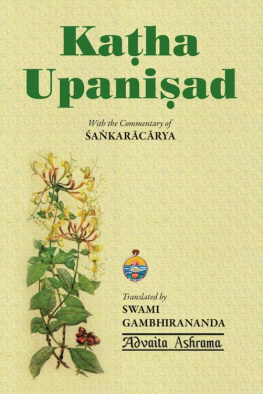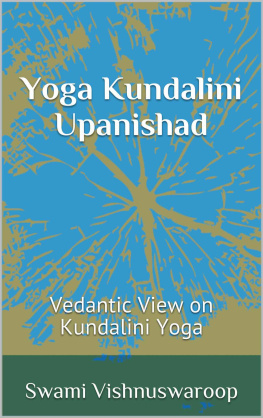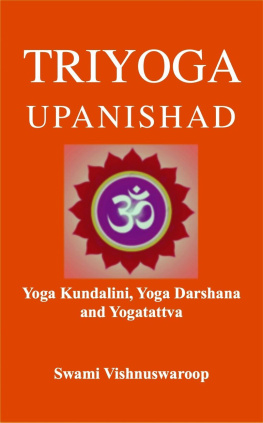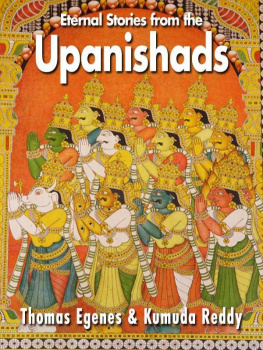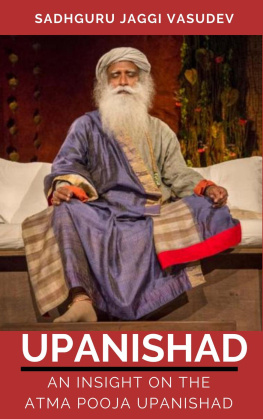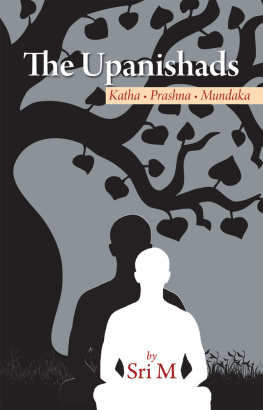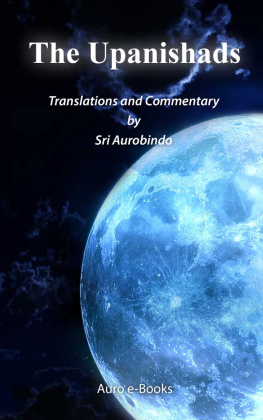Trbners Oriental Series
INDIA: RELIGION AND PHILOSOPHY
In 10 Volumes
- I The Snkhya Aphorisms of Kapila
James R Ballantyne - II The Religions of India
A Barth - II The Ordinances of Manu
Arthur Coke Burnell - III The Sarva-Darana-Sagraha
E B Cowell and A E Gough - IV Yoga
Surendranath Dasgupta - V Hind Philosophy
John Davies - VI The Bhagavad Gt
John Davies - VII A Classical Dictionary of Hindu Mythology and Religion, Geography, History and Literature
John Dowson - VIII The Philosophy of the Upanishads and Ancient Indian Metaphysics
Archibald Edward Gough - IX A Manual of Hindu Pantheism
G A Jacob
First published in 1891 by
Kegan Paul, Trench, Trbner & Co Ltd
Reprinted in 2000, 2002 by
Routledge
2 Park Square, Milton Park, Abingdon, Oxon, OX14 4RN
Transferred to Digital Printing 2006
Routledge is an imprint of the Taylor & Francis Group
1891 Archibald Edward Gough
All rights reserved. No part of this book may be reprinted or reproduced or utilized in any form or by any electronic, mechanical, or other means, now known or hereafter invented, including photocopying and recording, or in any information storage or retrieval system, without permission in writing from the publishers.
The publishers have made every effort to contact authors/copyright holders of the works reprinted in Trbners Oriental Series. This has not been possible in every case, however, and we would welcome correspondence from those individuals/companies we have been unable to trace.
These reprints are taken from original copies of each book. In many cases the condition of these originals is not perfect. The publisher has gone to great lengths to ensure the quality of these reprints, but wishes to point out that certain characteristics of the original copies will, of necessity, be apparent in reprints thereof.
British Library Cataloguing in Publication Data
A CIP catalogue record for this book
is available from the British Library
The Philosophy of the Upanishads and Ancient Indian Metaphysics
ISBN 0-415-24522-2
India: Religion and Philosophy: 10 Volumes
ISBN 0-41 5-24291-6
Trbner's Oriental Series
ISBN 0-415-23188-4
ISBN 978-1-136-39064-7 (ePub)
Printed and bound by CPI Antony Rowe, Eastbourne
PREFACE.

I HOPE that this book may be more or less useful to two classes of readers.
Those interested in the general history of philosophy will find in it an account of a very early attempt, on the part of thinkers of a rude age and race, to form a cosmological theory. The real movement of philosophic thought begins, it is true, not in India, but in India; but some degree of interest may still be expected to attach to the procedure of the ancient Indian cosmo-logists. The Upanishads are so many songs before sunrise,spontaneous effusions of awakening reflection, half poetical, half metaphysical, that precede the conscious and methodical labour of the long succession of thinkers to construct a thoroughly intelligible conception of the sum of things. For the general reader, then, these pages may supply in detail, and in the terms of the Sanskrit texts themselves, a treatment of the topics slightly sketched in the third chapter of Archer Butlers first series of Lectures on the History of Ancient Philosophy. The Upanishads exhibit the pantheistic view of things in a naively
To readers specially interested in Indian matters an introduction to the Upanishads is indispensable, and these pages will help to supply a want hitherto unsupplied. The Upanishads are an index to the intellectual peculiarities of the Indian character. The thoughts they express are the ideas that prevail throughout all subsequent Indian literature, much of which will be fully comprehensible to those only who carry with them a knowledge of these ideas to its perusal. A study of the Upanishads is the starting-point in any intelligent study of Indian philosophy. As regards religion, the philosophy of the Upanishads is the groundwork of the various forms of Hinduism, and the Upanishads have been justly characterised by Goldstlicker as the basis of the enlightened faith of India.
The Upanishads are treatises of various length, partly poetical, partly theosophical, which close the canon of Vedic revelation. The term Upanishad im ports mystic teaching, and the synonymous term Vednta means a final instalment of the Veda. The Upanishads are also called Vedntas, and the Aupanishad Mmns or philosophy of the Upanishads, in its developed form, is known as the Vedntic system. ruti, the Vedic revelation, consists of two parts, of a lower and a higher grade,the Karmaka, or portion treating of sacrifices, immemorial usages, and theogony ; and the Jnaka, or portion treating of the release of the soul from metempsychosis, by means of a recognition of its real nature as one with the characterless and impersonal Self. This impersonal Self, Brahman, as distinguished from the personal soul, the living, conscious, and migrating spirit, the Jva or Jvatman or Vijntman, is also styled the Paramtman or highest Self. The mystic teaching in which the Vedic revelation culminates is relative to the nature of this highest and impersonal Self. The Karmaka, or ritual portion of the Veda, is contained in the Mantras or hymns of the ishis, the spontaneous effusions of primitive Indian nature-worship, and the Brhmanas or liturgic and legendary compilations of the specialised sacrificial functionaries. Theosophic teaching is present, in combination with liturgic and mythologic elements, in the rayakas, a portion of the Vedic aggregate intimately allied to the Brhmaas. This teaching is further segregated and explicitly set forth in the Upanishads, and forms the Jnaka or theosophic portion of the Vedic revelation. As compared with the religion of sacrifices and ancestral rites, this teaching forms a higher religion, a more perfect way, for the recluses of the forest,a religion which will be seen to be largely metaphysical. Treatises bearing the name of Upanishads are numerous. Those in highest esteem have always been the Chhndogya, Bihadrayaka, a, Kena, Kaha, Prana, Muaka, Muky, Aitareya, Taittirya, vetvatara, Maitryaya, and Kaushtakbrhmaa Upanishads. The date of the Upanishads, like that of most of the ancient works of Sanskrit literature, is altogether uncertain. Any date that may have been assigned is purely conjectural ; and all that we can affirm in this regard is, that in relation to that literature they are of primitive antiquity, and the earliest documents of Indian religious metaphysics.
The greatest of the expositors of the philosophy of the Upanishads is ankara or ankarchrya. A great part of the matter of this volume is extracted from the various writings ascribed to him. He is said to have been a native of Kerala or Malabar, and to have flourished in the eighth century of the Christian era He is generally represented as having spent the greater part of his life as an itinerant philosophic disputant and religious controversialist. The Buddhists in his time were flourishing and widely predominant in India under the patronage of powerful Rajas, and we may presume that the great Vedntic doctor was thoroughly intimate with the tenets of Buddhist philosophy and religion. His exposition of some of these in his com mentary on the aphorisms of the Vednta is admirably perspicuous. The teaching of ankara himself is the natural and legitimate interpretation of the doctrines of the Upanishads. It is known as Advaitavda, the theory of universal unity, abstract identity, or absolute idealism. The Advaitavdins or Indian idealists are therefore often styled the nkaras or followers of ankara. They represent Indian orthodoxy in its purest form. The commentaries on the Upanishads ascribed to Sankara are elucidated in the glosses of nandajnagiri, a writer to whom reference will be found from time to time in the following pages. The most illustrious of the successors of Sankara, and, next to ankara, the greatest of the Indian schoolmen, is Mdhava or Mdhavchrya, known also by the surname of Syaa. He will also be referred to in this Mdhavchrya flourished in the fourteenth century.

